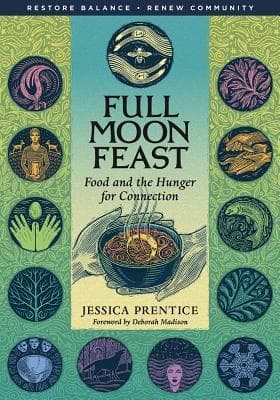
Book Review Summary: Full Moon Feast: Food and the Hunger for Connection
Introduction
In the book "Full Moon Feast: Food and the Hunger for Connection," author Jessica Prentice takes readers on a journey through the thirteen lunar cycles of an agrarian year, exploring the connections between food, the environment, human communities, and traditional cooking methods. Prentice, a professional chef, author, and local foods activist, champions locally grown, humanely raised, nutrient-rich foods and traditional cooking practices. Through her writing, she seeks to reconnect readers with their food sources and promote a deeper understanding of the impact of modern food culture on our bodies and communities.
About Jessica Prentice
Jessica Prentice is a sought-after speaker and author known for her work in healing our broken food system. Her book "Full Moon Feast" (Chelsea Green, 2006) explores the connections between the environment, human communities, and traditional cycles through food. Prentice is a co-founder of Three Stone Hearth, a community supported kitchen in Berkeley that uses local, sustainable ingredients to prepare nutrient-dense, traditional foods on a community scale. She is also the creator of the Local Foods Wheel and known for coining the term "locavore." Prentice's writing combines the radical nutrition of Sally Fallon's "Nourishing Traditions," keen agri-political acumen, and a spiritual sensibility that draws from indigenous as well as Western traditions.
Analysis of Views
-
Reconnecting with Nature: Readers appreciate the book's focus on reconnecting with nature through food. Prentice's exploration of lunar cycles instead of seasonal eating provides a fresh perspective on seasonal eating practices.
-
Environmental Stewardship: Many readers commend Prentice for emphasizing environmental stewardship and responsible farming practices. Her critique of modern food production methods resonates with readers who share concerns about the impact of industrial agriculture on our planet.
-
Food as a Skill and Vitality: Prentice's emphasis on cooking as a skill essential for personal well-being resonates with readers. She challenges the notion that cooking is beneath anyone and advocates for everyone to engage in this essential task.
-
Romanticizing Indigenous Cultures: Some readers feel that Prentice romanticizes indigenous cultures and traditional food practices, oversimplifying their complexities. They point out that she often refers to "traditional" and "indigenous" cultures as if they are unitary groups with a single practice.
-
Balancing Tradition and Modernity: Readers appreciate Prentice's balanced approach to incorporating traditional food practices while acknowledging the benefits of modern food production methods. She highlights the need to preserve the benefits of modern life while reconnecting with our food and the earth.
Reasons for Recommendation
-
Inspiring Recipes: Readers recommend "Full Moon Feast" for its diverse range of recipes tied to specific lunar periods. The book offers readers an opportunity to explore new flavors and traditional cooking methods while connecting with nature's rhythms.
-
Thought-Provoking Perspectives: The book challenges readers to reconsider their relationship with food and encourages them to explore the impact of modern food culture on their health and communities. Prentice's insights inspire readers to think critically about their food choices and take action towards a more sustainable future.
-
Engaging Writing Style: Many readers praise Prentice's writing style, describing it as evocative, engaging, and deeply nourishing. Her ability to weave together personal stories, cultural traditions, and nutritional advice makes the book an enjoyable and enlightening read.
Reasons for Not Recommendation
-
New-Agey Tone: Some readers find the book's tone too new-agey or mystical for their taste. They prefer more straightforward information and less emphasis on spirituality or mysticism in their food-related reading.
-
Lack of Focus on Seasonal Eating: A few readers express disappointment that Prentice does not focus more on seasonal eating by "Summer, Fall, Winter, Spring." They feel that her use of lunar cycles may be confusing or less accessible for those unfamiliar with these cycles.
Conclusion
"Full Moon Feast: Food and the Hunger for Connection" by Jessica Prentice offers readers a thought-provoking exploration of our relationship with food and nature. Through her writing, Prentice challenges readers to reconsider their food choices, connect with their local communities, and embrace traditional cooking methods that prioritize nutrition and sustainability. While some readers appreciate the book's unique perspective and engaging writing style, others find it too new-agey or lacking in focus on seasonal eating. Overall, "Full Moon Feast" serves as a valuable resource for those seeking to deepen their understanding of food culture and its impact on our world.